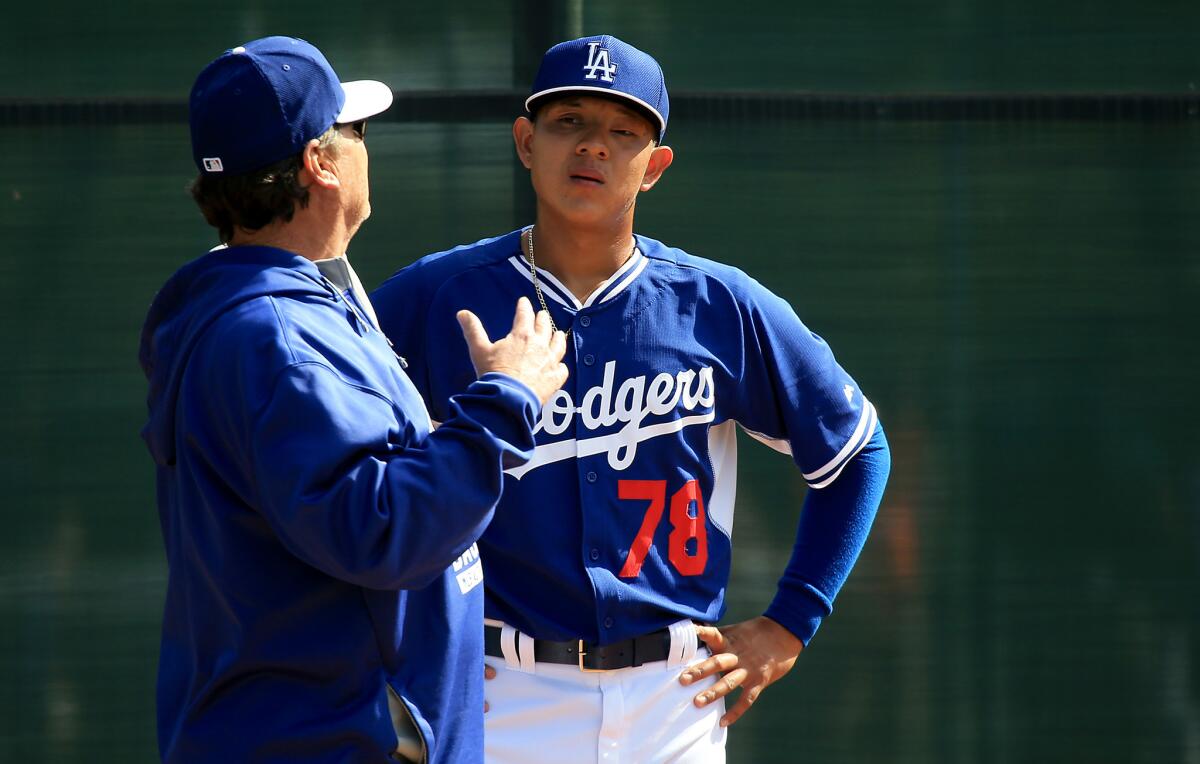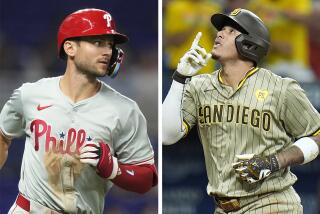Could Julio Urias be the new Fernando Valenzuela for Dodgers in September?

Dodgers pitching coach Rick Honeycutt talks to top prospect Julio Urias (78) at spring training.
- Share via
ESPN had just turned 1. Baseball America had not yet been born. The Futures Game was decades away.
This September marks the 35th anniversary of one of the most auspicious debuts in major league history, when the Dodgers called up a Mexican prodigy from double A, a 19-year-old left-hander polished and poised beyond his years, and started his career in the bullpen.
Could history repeat itself this September, with Julio Urias reprising the role played by Fernando Valenzuela?
In 1980, Valenzuela delivered 17 2/3 innings of relief, without surrendering an earned run. Of the Dodgers’ final 21 games that season, he pitched in 10.
“Immediately, you became dependent on him,” said Dodgers coach Davey Lopes, the second baseman on that 1980 team. “You knew he would do something to stop whatever was happening.
“He was so good that people said he can’t be that young.”
In this year’s bullpen, the Dodgers can count on closer Kenley Jansen and . . . well, these are the final hours of August, and they’re still trying to sort out the setup crew.
Urias has pitched more minor league innings than Valenzuela had when he made his debut. He has a better earned-run average, walk rate and strikeout rate in double A this year than Valenzuela did in 1980.
Would Urias be ready to help the Dodgers bullpen right now?
“We’ll see,” said Valenzuela, now a Dodgers broadcaster. “I hope they can call him up. That’s the only way we can find out what he has.”
Valenzuela says it might be a good idea for the Dodgers to promote Urias in September, even if they do not plan to use him prominently.
“That way, he can see what’s going on around him, get more familiar with the big league level,” Valenzuela said. “I think that’s going to help him out.”
That kind of apprenticeship might be invaluable, but the Dodgers do not plan to call up Urias unless they determine he will be a difference-maker.
Valenzuela was the Dodgers’ opening day starter in 1981, but Urias does not figure to break camp with the team next spring, so calling him up now would eliminate a spot on the 40-man roster that the Dodgers could use for another year.
Urias also would face pressure that Valenzuela did not. In 1980, prospects were largely anonymous. Today, even the casual Dodgers fan is familiar with Urias — signed out of the same scouting expeditions that landed Yasiel Puig, pitched in the Futures Game at 17, untouchable in trades that might have landed David Price.
The Dodgers believe the “guy we wouldn’t trade for Price” tag will wear off Urias soon enough. For now, Price is 4-0 with a 1.98 ERA for the Toronto Blue Jays, the epitome of grace under pressure — pitching for the fans of an entire country, for a team with baseball’s longest postseason drought.
“It’s no pressure,” Price said. “It’s what I expect. It’s what I’ve been for a couple years now. It’s no different for me. The mound is still 60 feet 6 inches out there, and I expect to get the same results.”
After Price beat the Angels last weekend in Anaheim, he said he had paid no attention to the cries of Dodgers fans starved for their first World Series since 1988 and disappointed that their team passed on him. Did Price have any words of consolation for them?
“Zero,” he said.
Think (red, white and) blue
If Los Angeles wins the 2024 Olympics, what venue would be used for baseball?
That’s a trick question, at least for now. The International Olympic Committee kicked out baseball a decade ago, largely frustrated by the refusal of Major League Baseball to shut down its season for a couple weeks — as the National Hockey League does — so the world’s best players can compete in the Games.
The NHL needs the exposure. MLB shrugged and launched the World Baseball Classic, a rousing success outside the United States. Soccer’s marquee event is the World Cup, not the Olympics, and yet the IOC happily permits a youth tournament to decide its soccer medalists.
Baseball does not carry the global cachet of soccer. However, when the IOC decides next year which sport to add for the 2020 Tokyo Games, that sport ought to be baseball — over karate, squash, surfing, bowling, roller sports, sport climbing, and wushu.
That could set the stage for a return of Olympic baseball to Dodger Stadium in 2024, 40 years after Mark McGwire led a star-studded amateur U.S. team that won the silver medal.
Of the 20 players on that team, 18 were first-round picks — 13 in the 1984 draft, five in the 1985 draft. The team included such stars as McGwire (USC), Will Clark (Mississippi State) and Barry Larkin (Michigan).
In order to promote the game, McGwire said MLB allowed the 1984 draftees to play in the Olympics before starting their pro careers. He said MLB should adopt the same rule in any future Olympics, to showcase players who could be future stars.
“How great it would be to put them on a pedestal prior to their major league career,” said McGwire, now the Dodgers’ hitting coach.
Dodgers pitcher Brett Anderson played on the last U.S. Olympic baseball team, in 2008. Hyun-Jin Ryu and South Korea won gold, Anderson and the U.S. won bronze. Anderson said he would love to see baseball back in the Olympics.
“I like baseball better than most sports,” he said. “For selfish reasons, I’d rather watch baseball than a shooting event or BMX or whatever.
“But I had the last win for USA Baseball in the Olympics. So, if they don’t [bring it back], I’ll always have that.”
Twitter: @BillShaikin
More to Read
Go beyond the scoreboard
Get the latest on L.A.'s teams in the daily Sports Report newsletter.
You may occasionally receive promotional content from the Los Angeles Times.











